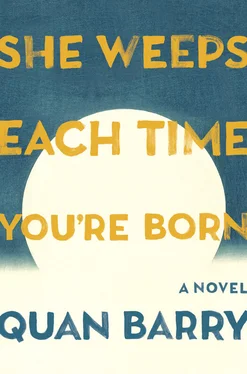Toward afternoon we heard the boat. None of us had to look. It took more than forty minutes before they reached us. The waters were so calm we could see it a hundred waveless miles away. The sailors pulled me up first. When they pulled Qui on board, I gasped. I hadn’t noticed while we were drifting on the ocean. Standing on deck, her skin was still as pale as the underbelly of a fish, but over the course of three days lost at sea, her long black hair had turned white from root to tip.
Someone brought us a blanket. I can’t say they were unkind. On top of the boat the red flag waved with the yellow star, a single lidless eye.
Where’s Son, I said. I became frantic. One of the sailors put his arms around me to keep me from jumping back into the sea. Where is he, I shouted. A sailor came and handed us a burlap sack and a pale blue rice bowl. This is all that was out there, he said. The sack rattled as Qui took it. I could hear voices chattering softly. I knew it was full of the bones of generations.
Levka rolled over and ran his fingers through her hair. A few pieces got stuck in his ring. Gently he freed them with his other hand. With his finger he traced a pattern in her freckles, connecting them one by one. She could see tears glistening in the corners of his eyes. Почему ты всегда молчишь? She lifted her head as he inched himself into her. She was fifteen years old in the ancient system of reckoning. The way they moved together she thought of the ocean. Why are you always so quiet, he cried. You never say a word. She felt the wave cresting in her body, and even then she stayed silent, every muscle in her body screaming. The gibbous moon hung in the window, the long bright ears of the rabbit just starting to show.
TOWARD THE END OF THE SUMMER RAINS VAN DISAPPEARED. Each day Qui searched for him across the street in the concrete pit, but he was never there, a figure with muddy feet coming toward her bearing a red chrysanthemum. A light seemed to dim in Qui’s face, the flowery perfume on her breath receding. The few nights Rabbit slept in their one room by the bus depot she could hear Qui shivering, her bones rattling in their sockets. Rabbit thought of the year the two of them had spent in the reeducation camp after the government sailors pulled them out of the sea. How one night Rabbit watched a new arrival, an old Chinese woman deprived of her nightly tar, the woman shaking uncontrollably, spit running down her chin.
The final night when Qui’s sickness was at its worst, Rabbit got up off her mat. Qui, she said, placing her hand on Qui’s forehead. Let it pass. Qui put her hand on Rabbit’s neck. After a while, Rabbit let herself be pulled down to Qui’s chest. It was the first time since the long days floating off the tip of Vietnam in the Gulf of Thailand almost seven years before. Air where there shouldn’t be air. Light spilling out of the darkness of the body. Rabbit had forgotten how sweet it tasted.
In the morning Qui was bright as a star, the pain of withdrawal long behind her, her skin and hair the same unearthly white. In the days that followed, Rabbit began to find small gifts left in front of their door or under the cinnamon tree on Duong Khiem. At first Rabbit thought they were from Van. Then early one morning as she returned from the Russian quarter, she saw one of their neighbors leaving a bowl of rice. The woman bowed her head and clapped her hands together in front of her face the way people did in the temples. It was obvious she was praying, but for what, Rabbit wondered. Then the woman scurried off.
Two weeks after Qui pulled Rabbit to her breast, Van appeared on Duong Khiem just as they were packing up their supplies for the night. His mangled hand was heavily bandaged. Just by looking, Rabbit could tell he had only one finger left.
Van kept himself in the shadow of the cinnamon tree. Qui put down the basket of leftover lemons she’d been packing. I have to leave Hoa Thien tonight, he whispered. Qui took his hand in her hands and held it to her chest. The blood seeped through his bandages. She let go and disappeared behind the iron fence. A few minutes later she came back with a jar filled with milk. Tell him to bathe his wound with it, said Son from his perch in the tree. Bathe your wound with it, Rabbit said. Qui handed Van the jar. He touched his forehead with his one remaining finger and disappeared down the street.
Years later they would see him again in Hanoi’s Old Quarter on the shore of Hoan Kiem Lake, Rabbit’s fame having spread all over the north. At first she didn’t recognize him, his shy smile, his finger fully restored, the finger warm to the touch but heavily scarred at the knuckle. He had come to ask Rabbit of his wife and son. After all these years, had they made it to safety? Were they alive? Van would tell her of his fears, the smugglers always searching for him, constantly ratcheting up the price of his family’s escape. In her grand house on the Street of Shoes, Rabbit will wrap both her hands around the two fingers Van has left and look him in the eye. Your son lives, she will say. Your wife and your enemies are dead.
THEY WERE SITTING UNDER THE CINNAMON TREE. RABBIT, QUI, Son. It was two hours past noon. A bird was singing in the branches, the sound like a man whistling. The three of them were drowsing peacefully by the fragrant trunk, each with their own thoughts, the smell of the cinnamon perfuming their blood. How do you think it will end, Son said suddenly. The question floated up into the air.
Rabbit thought of the planets spinning wordlessly in space. She knew nothing was permanent, Levka’s body arcing over her as he cried in his helplessness, the skin trembling by the corners of his eyes. She repeated Son’s question. End? She looked and saw the wetness growing on the front of Qui’s shirt, the stain expanding like a map. Maybe Qui knew. Maybe they all knew. End? That instant, forty miles away in the scrubby brush of Anne-Marie, it was ending.
The French named everything after their mistresses. Anne-Marie. Beatrice. Claudine. Dominique. Eliane. Flavie. Gabrielle. Huguette. The whole of Dien Bien Phu feminized and quartered. 1954 and we saw men we had never seen before — the Senegalese with their skins like night, the Moroccans and Algerians with their centuries of mixed blood, their bowing down to a fixed spot on the horizon in the middle of battle five times a day. After us, the Africans would also take up the gun against their oppressors, but we did it first though in our war many of our colonized brothers put down their weapons and lay back in the trenches, even the Black Tai who had allied themselves with the French slinking off into the hills. And at the end of two months, we won. Then the Americans, the Cambodians, the Chinese as it has been between us for a thousand years. But those months in ’54 on the plains and in the valleys of Dien Bien Phu, our bodies mixed unintelligibly. Black, white, yellow. We whisper together. There is so much we know that we cannot say. So many of us are still here sleeping in the earth until someone decides it is time to sort us out and take us home .
IT HADN’T RAINED FOR DAYS. NOW IT LOOKED LIKE IT wouldn’t. The season was still some months from the deepest cold of a temperate winter. At the foot of the cinnamon tree Rabbit sat studying the cloudless sky. The red-breasted parrot from earlier in the day had flown away. Overhead the stars were beginning to appear. She always missed the rains when they stopped. There was something comforting about the sound of water hammering the roofs, the sound as if you were being given a second chance, the world washed clean.
The trucks began to return at the usual hour. Qui had already left for home, her body floating down the street as if the moon were walking the earth. Son was sitting in the highest bough of the cinnamon tree. The bats were beginning to appear, overhead Venus turning on in the twilight. Rabbit was sitting with her back against the tree, the scent of cinnamon filling her head. The first truck was off-loading. She didn’t pay it any notice. Levka was always in the last truck. Any minute now the last truck would come barreling up the street, loose grit swirling through the air. He would leap off and sneak up on her, running his finger over her freckles. She was thinking of the way she had taken him in her mouth for the first time the night before, the intimacy of his cries as she hummed. She played the moment over and over in her head, the secret moments between two people. Just the moon in the window and all over the walls.
Читать дальше












